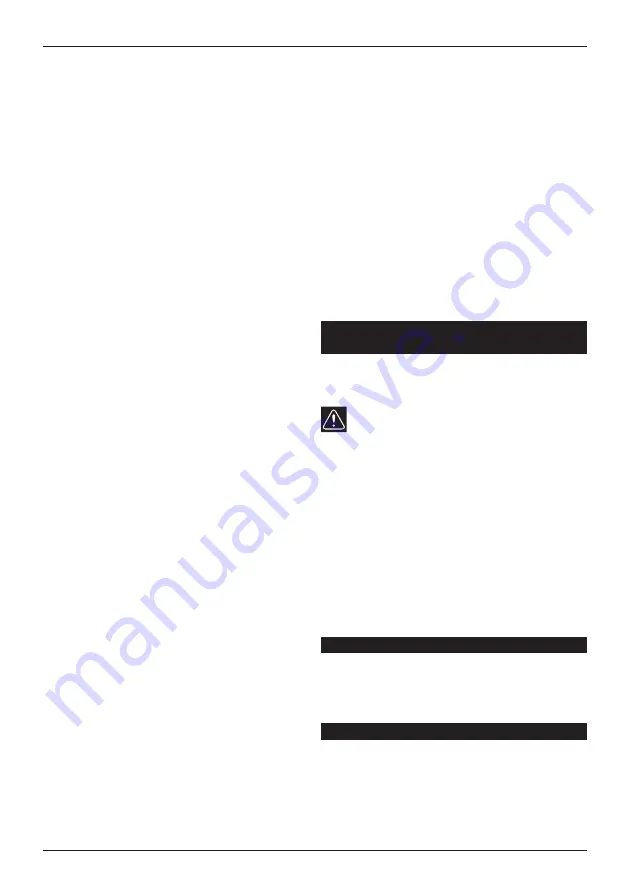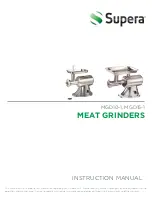
English
16
ing procedures or conditions and can be avoided by taking proper
precautions as given below.
a)
Maintain a firm grip on the power tool and position your
body and arm to allow you to resist kickback forces. Always
use an auxiliary handle, if provided, for maximum control
over kickback or torque reaction during start‑up.
The oper-
ator can control torque reactions or kick-back forces, if proper
precautions are taken.
b)
Never place your hand near the rotating accessory.
Acces-
sory may kickback over your hand.
c)
Do not position your body in the area where power tool
will move if kickback occurs.
Kick-back will propel the tool
in direction opposite to the wheel’s movement at the point of
snagging.
d)
Take special care when working corners, sharp edges etc.
Avoid bouncing and snagging the accessory.
Corners, sharp
edges or bouncing have a tendency to snag the rotating ac-
cessory and cause loss of control or kickback.
e)
Do not attach a saw chain woodcarving blade or toothed
saw blade.
Such blades create frequent kickback and loss of
control.
Safety warnings specific for grinding and
cutting‑off operations:
a)
Use only wheel types that are recommended for your pow‑
er tool and the specific guard designed for the selected
wheel.
Wheels for which the power tool was not designed
cannot be adequately guarded and are unsafe.
b)
Use only the specific guard designed for the selected
wheel. The guard must be securely attached to the pow‑
er tool and positioned for maximum safety, so the least
amount of wheel is exposed towards the operator.
The
guard helps to protect the operator from broken wheel frag-
ments and accidental contact with the wheel.
c)
Wheels must be used only for recommended applications.
For example: do not grind with the side of cut‑off wheel.
Abrasive cut-off wheels are intended for peripheral grinding,
side forces applied to these wheels may cause them to shat-
ter.
d)
Always use undamaged wheel flanges that are of correct
size and shape for your selected wheel.
Proper wheel flang-
es support the wheel thus reducing the possibility of wheel
breakage. Flanges for cut-off wheels may be different from
grinding wheel flanges.
e)
Do not use worn down wheels from larger power tools.
Wheels intended for larger power tools are not suitable for
the higher speed of a smaller tool and may burst.
Additional safety instructions for cutting‑off
operations:
a)
Do not “jam” the cut‑off wheel or apply excessive pressure.
Do not attempt to make an excessive depth of cut.
Over-
stressing the wheel increases the loading and susceptibility to
twisting or binding of the wheel in the cut and the possibility
of kickback or wheel breakage.
b)
Do not position your body in line with and behind the
rotating wheel.
When the wheel, at the point of operation,
is moving away from your body, the possible kickback may
propel the spinning wheel and the power tool directly at you.
c)
When wheel is binding or when interrupting a cut for any
reason, switch off the power tool and hold the power tool
motionless until the wheel comes to a complete stop. Nev‑
er attempt to remove the cut‑off wheel from the cut while
the wheel is in motion otherwise kick‑back may occur.
In-
vestigate and take corrective action to eliminate the cause of
wheel binding.
d)
Do not restart the cutting operation in the workpiece. Let
the wheel reach full speed and carefully reenter the cut.
The wheel may bind, walk up or kickback if the power tool is
restarted in the workpiece.
e)
Support panels or any oversized workpiece to minimise
the risk of wheel pinching and kick‑back.
Large workpieces
tend to sag under their own weight. Supports must be placed
under the workpiece near the line of cut and near the edge of
the workpiece on both sides of the wheel.
f)
Take extra caution when making a “pocket cut” into exist‑
ing walls or other blind areas.
The protruding wheel may cut
gas or water pipes, electrical wiring or objects that can cause
kickback.
Safety Warnings Specific for Sanding
Operations:
a)
Do not use excessively oversized sanding disc paper. Fol‑
low manufacturers recommendations when selecting
sanding paper.
Larger sanding paper extending beyond the
sanding pad presents a laceration hazard and may cause
snagging, tearing of the disc or kickback.
Safety Warnings Specific for Wire Brushing
Operations:
a)
Be aware that wire bristles are thrown by the brush even
during ordinary operation. Do not overstress the wires by
applying excessive load to the brush.
The wire bristles can
easily penetrate light clothing and/or skin.
b)
If the use of a guard is recommended for wire brushing,
do not allow any interference of the wire wheel or brush
with the guard.
Wire wheel or brush may expand in diameter
due to work load and centrifugal forces.
Information about noise level and
vibrations
The values have been measured in conformity with EN 60745.
Acoustic pressure level L
pA
= 85 dB (A).
Acoustic power level L
wA
= 96 dB (A).
In accuracy of measurements K = 3 dB (A).
ATTENTION! Noise is generated during work!
Use ear protection!
The weighted value of vibrations affecting hands and arms
a
h
= 5.34 m.s
-2
.
In accuracy of measurements K = 1.5 m.s
-2
.
The emission values specified (vibration, noise) were measured in
accordance with the test conditions stipulated in EN 60745 and are
intended for machine comparisons. They are also used for making
preliminary estimates regarding vibration and noise loads during
operation.
The emission values specified refer to the main applications for
which the power tool is used. If the electric power tool is used for
other applications, with other tools or is not maintained sufficient-
ly prior to operation, however, the vibration and noise load may be
higher when the tool is used.
Take into account any machine idling times and downtimes to esti-
mate these values more accurately for a specified time period. This
may significantly reduce the load during the machine operating
period.
Double insulation
To ensure maximum safety of the user, our tools are designed and
built to satisfy applicable European standards (EN standards). Tools
with double insulation are marked by the international symbol of
a double square. These tools must not be grounded and a two-wire
cable is sufficient to supply them with power. Tools are shielded in
accordance with EN 55014.
Use
The machine is designed for splitting, roughing and brushing met-
al and stone materials without the use of water. For cutting stone,
a cutting guide is required.
The user himself is liable for any improper use.
Summary of Contents for EBU 115-10
Page 3: ...3 1 2 3 4 5 9 10 15a 10 15b 18 18 16 8 14 12 16 17 16 13 12a 7 6a 11 6b...
Page 30: ...o 30 4 a 5 a a...
Page 31: ...o 31 a...
















































